
Sleep Apnea Therapy – Baytown, TX
What Exactly is Sleep Apnea?
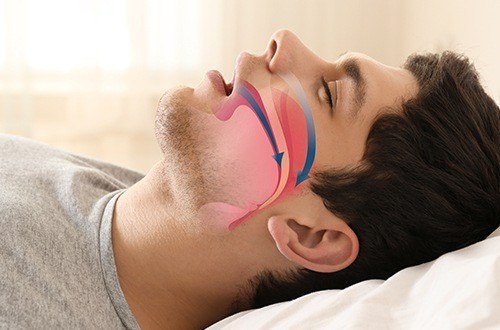
Simply defined, sleep apnea occurs when a patient regularly stops breathing for ten or more seconds at a time while resting. These instances, known as “apnea,” can occur dozens or even hundreds of times every single night. At Sleep Better Baytown, we offer a variety of options for sleep apnea therapy in Baytown, TX.
There are two major types of sleep apnea. Central Sleep Apnea (CSA) occurs when the brain fails to send out a signal to the body during sleep that it should inhale and exhale. However, the much more common type is Obstructive Sleep Apnea (OSA), which occurs when there’s some sort of blockage in the airway that prevents oxygen from successfully reaching the rest of the body. In rare instances, a patient will experience a combination of these two types of sleep apnea.
No two cases of sleep apnea are exactly the same, and symptoms can vary from patient to patient. However, there are some common indicators that you should be on the lookout for:
- Loud, chronic snoring
- Regularly experiencing headaches, dry mouth, or a sore throat in the mornings
- Problems with concentration and/or memory
- Excessive feelings of fatigue, exhaustion, and sleepiness in the mornings
- Regularly waking up out of breath or gasping for air
- Chronic sexual dysfunction
- Noticeable mood swings
Experience Successful Sleep Apnea Treatment
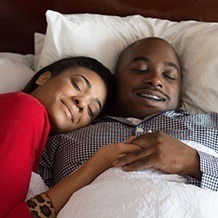
The first major step towards helping patients with sleep apnea is determining whether they’re a victim of CSA or OSA. At Sleep Better Baytown, our initial recommendation will be for you to complete the STOP-BANG assessment, which is a short and simple “yes” or “no” survey that can indicate your overall risk. If the results come back positive, it will be time to undergo a sleep study. Finally, once Dr. Hutto understands the exact cause and severity of your symptoms, treatment planning can commence.
Patients who are determined to suffer from mild to moderate OSA should be able to achieve lasting relief with a custom-made oral appliance. In fact, the American Academy of Sleep Medicine strongly recommends that this should be the first therapy method that dentists and doctors recommend. If the patient is experiencing severe OSA/CSA, traditional CPAP treatment or combined therapy (the use of both a CPAP and an oral appliance) is likely to be more effective.
Did You Know?

- Patients who suffer from untreated sleep apnea are more likely on average to be obese, struggle with weight loss, and find themselves incapable of keeping weight off after losing it.
- Many people who believe that they’re experiencing insomnia are actually waking up regularly throughout the night thanks to Obstructive Sleep Apnea.
- As long as adults sleep for 7-8 hours on a consistent basis, there is no reason that they should feel excessively tired or fatigued during the daylight hours.
- The negative effects of sleep deprivation and untreated sleep apnea are so severe that they’re comparable to Alzheimer’s, alcoholism, and drug addiction.
- Sleep apnea is one of the top causes of chronic erectile dysfunction.
- Do you regularly take trips to the bathroom in the middle of the night? Sleep apnea is a likely cause of this habit.
- Do you grind your teeth? This harmful action can also indicate the presence of untreated sleep apnea.
- Around 80% of patients who currently suffer from sleep apnea have either been misdiagnosed or have never received a proper diagnosis at all. An even greater percentage aren’t receiving the proper treatment for their condition.
- While snoring isn’t necessarily directly related to sleep apnea, chronic snorers are still more likely to develop the condition over time and experience a higher risk of strokes, cardiac disease, acid reflux, and more. That’s why Dr. Hutto regularly recommends the use of a custom-made oral appliance for patients who excessively snore.
- The size of a patient’s tongue and/or neck may actually put them at greater risk for developing sleep apnea over time.
- A lack of quality sleep can increase a person’s risk for being involved in a motor vehicle accident dramatically. In fact, when testing tired test subjects against inebriated test subjects on a closed course driving test, the former group was found to be MORE likely to be involved in an accident.
Snoring Isn’t Dangerous? Think Again

One of the earliest indications of sleep apnea in a patient is often snoring. Snoring occurs in much the same way as singing, speech, and laughter all do – air vibrates throughout the mouth and against the throat and tongue. This can occur when the airway is experiencing a minor obstruction during sleep. While breathing may not be entirely hindered, it can still lead to patients struggling to inhale and exhale to the fullest extent. Over time, chronic snoring can lead to the gradual development of sleep apnea because of these difficulties.
If you don’t currently experience full-blown sleep apnea but still snore loudly on a consistent basis, we recommend that you reach out to Sleep Better Baytown and schedule a consultation. Dr. Hutto can design an oral appliance that helps repositions the mouth comfortably and reduces your lifelong risk for health problems like heart disease, high blood pressure, strokes, and other negative consequences caused by a lack of good sleep.
Learn More About Snoring and Sleep Dentistry
A Solid Alternative to CPAP Treatment
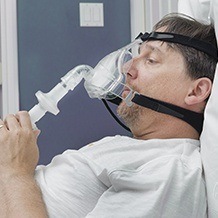
For many years, CPAP machines have been considered the gold standard when it comes to sleep apnea treatment. While it’s true that advanced cases of OSA or CSA may still require CPAP intervention for true relief, the ugly truth is that an alarming majority of patients are actually CPAP intolerant.
When using a CPAP, the patient must wear a mask that covers their face and/or nose and forces air down their lungs. The machinery is notorious for being loud as well, and many people simply can’t get used to the sights and sounds associated with it. If you are a chronic snorer or have been diagnosed with mild to moderate sleep apnea, Dr. Dean Hutto strongly recommends giving oral appliance therapy a try first. Our practice offers several different brands of appliances that can be used to conservatively and comfortably reposition the jaw as you rest easy, helping the airway stay open and unencumbered. These oral appliances are also very easy to keep clean and small enough that they can be traveled without any strain. Best of all, patients are much more likely to use them consistently!
Is Oral Appliance Therapy for Sleep Apnea Covered by Insurance?
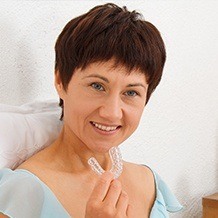
In most cases, a patient’s medical insurance will cover the cost of oral appliances used to treat sleep apnea. Recently, some dental insurance plans have also begun to include this type of coverage. Our team here in Baytown, TX is very knowledgeable about all matters regarding insurance, and we’ll be happy to file claims, work directly with providers, and help patients maximize the reimbursements they deserve.
Understanding the Cost of Sleep Apnea Treatment
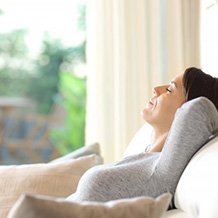
Various factors can impact the overall price of sleep apnea therapy. During your consultation, our team will develop a proper plan to address your situation while also walking you through the details of the cost of your treatment plan. We will also be glad to help file insurance claims on your behalf so that your experience is as smooth as possible. Even if sleep apnea treatment might seem costly, you can be sure the investment will be worthwhile for both your health and overall quality of life.
Sleep Apnea FAQs
Why Should I See a Dentist for Sleep Apnea Treatment?
It might seem odd to go to the dentist instead of your doctor to get sleep apnea treatment. However, sleep dentists like Dr. Hutto have specialty training in using oral appliances to help their patients find relief. They’re also experts when it comes to all areas of your mouth, including the upper respiratory system.
While they can’t diagnose sleep apnea, they work closely with sleep physicians to ensure you're getting the best care possible. If you’re struggling with snoring, morning fatigue, or interrupted sleep, a trip to our Baytown dental office might be just what you need.
Does Everyone Who Snores Have Sleep Apnea?
No, not everyone who snores has sleep apnea. While loud or chronic snoring is a common symptom of the condition, it doesn’t mean you have it. Snoring can actually have multiple causes, from nasal congestion to sleep position or alcohol use.
However, if your snoring is paired with symptoms like gasping for air, frequent awakenings, or feeling sleepy during the day, it could point to OSA. Dr. Hutto at Sleep Better Baytown can evaluate your symptoms and work with a sleep specialist to help you determine whether sleep apnea is present.
Once you have a formal diagnosis, our team can work with you to find a treatment that’s right for you.
Can I Have Oral Appliance Therapy If I Grind My Teeth?
Yes! In fact, oral appliance therapy can be especially beneficial if you grind your teeth at night. Sleep apnea and bruxism (teeth grinding) often go hand in hand, as disrupted breathing can trigger jaw clenching and grinding.
Our custom oral appliances are built with sturdy materials that can act as a protective barrier between your teeth while simultaneously keeping your airway open. This helps reduce damage from grinding while improving your breathing during sleep. It’s a two-in-one solution that can protect your smile and help you sleep more peacefully.
How Soon After Starting Sleep Apnea Treatment Will I Notice Improvement?
Many patients begin to feel better within just a few nights of using their oral appliance. You may notice deeper sleep, reduced snoring, and more energy during the day. That said, everyone’s experience is different. Some may take a couple of weeks to fully adjust to the appliance and feel the effects.
Our team at Sleep Better Baytown will check in with you periodically to monitor your progress and make any necessary adjustments to maximize your results. If you’re curious about how effective your appliance is, you could take another sleep test. However, in most cases, reduced symptoms will be proof enough that it’s working!
How Long Are Apnea Events or Episodes?
Sleep apnea events can last ten seconds or longer, even up to two minutes. They can also occur between five and 30 times each hour of sleep.
A sleep test will reveal how advanced your particular case of sleep apnea is, including how frequently episodes occur, and which type of sleep apnea you have.
Zero to 15 episodes per hour is considered mild, while 30 or more episodes per hour is considered severe.
Can I Diagnose Sleep Apnea on My Own?
Just because you have symptoms of sleep apnea does not mean you definitely have sleep apnea. It is important to have an official diagnosis of which type of sleep apnea you have before beginning treatment.
Devices such as Apple Watches may help alert you to sleep apnea, but they cannot comprehensively diagnose or test for it. Only a sleep test from a qualified sleep doctor can do this.
Will Oral Appliance Therapy Make CPAP Therapy Unnecessary?
CPAP therapy works by physically forcing the airway open with tubing and a mask that you wear throughout the night. Unfortunately, however, only about 50 percent of patients who are prescribed CPAP actually use it. That’s because many consider it awkward and uncomfortable.
In some cases of mild to moderate sleep apnea, an oral appliance can be used to replace CPAP therapy.
If you have severe sleep apnea, oral appliance therapy may not be the best option, as it might not work as efficiently on its own.
Speak with your sleep doctor and dentist to find the right solution or solutions for your situation.
Will My Sleep Apnea Go Away If I Lose Weight?
It is possible that your sleep apnea symptoms could lessen or go away if you lose weight, as excess weight is a major risk factor for obstructive sleep apnea (OSA). That’s because excess weight and tissue can block your airway. Losing weight could potentially reduce tissue in your airway, however, there is still a chance that you could continue to have sleep apnea even after weight loss.
The best way to determine if your condition has improved is to have another sleep test.